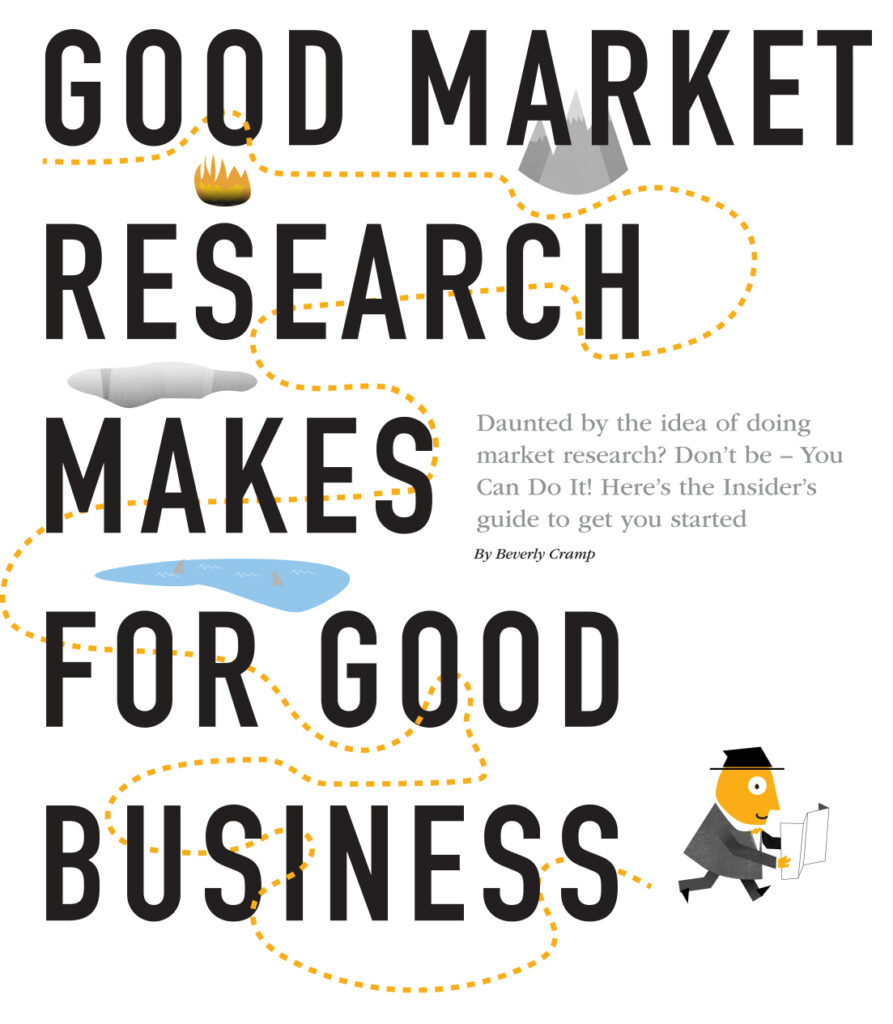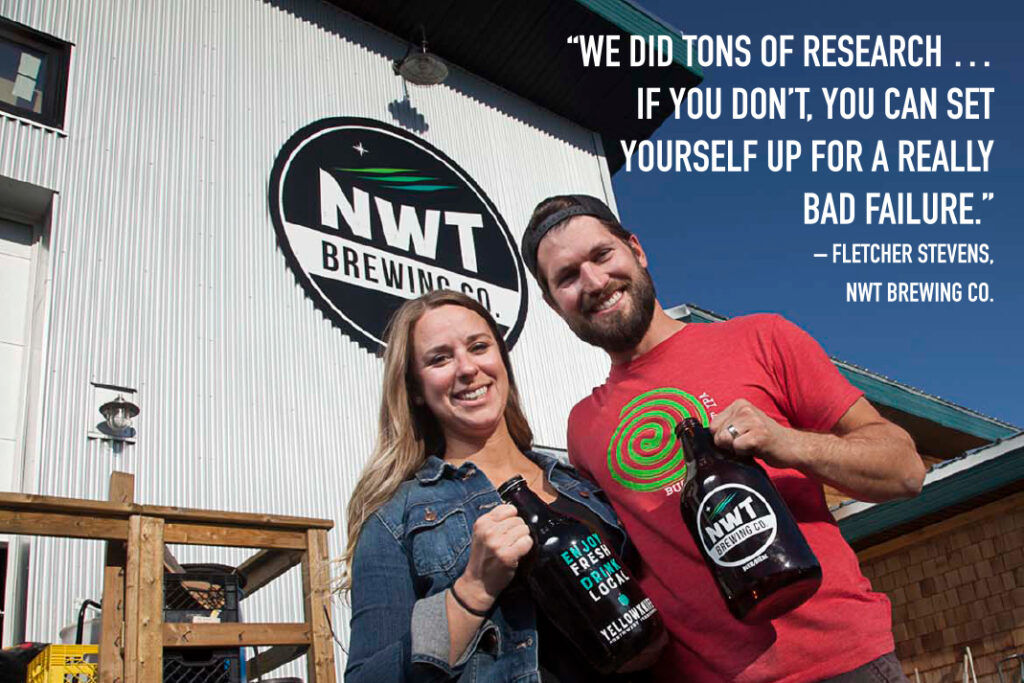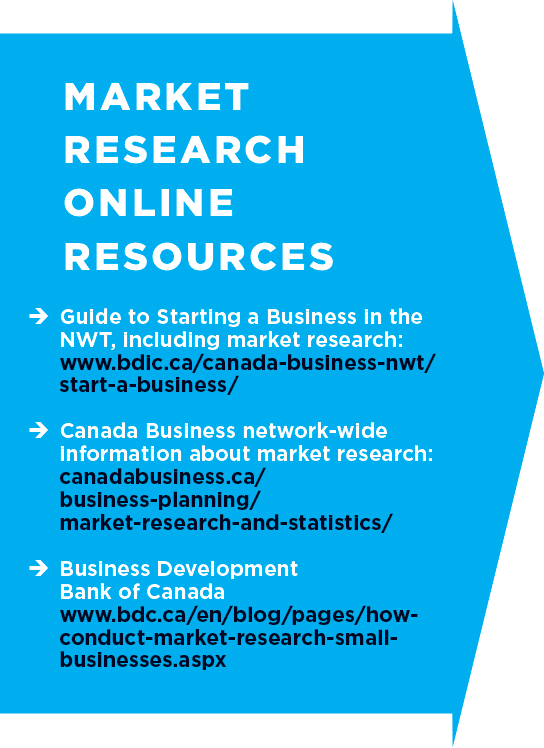Good Market Research makes for good business

For entrepreneurs, doing market research is as important as doing a business plan. In fact, market research is the foundation for both the marketing and the business plan. Whether you’re starting a new business or own an established one, you need to know about your marketplace to make good business decisions and avoid bad ones that can lead to the risk of business failure. Brad Poulter is the manager of business services and communications for the Northwest Territories Business Development & Investment Corporation (BDIC), an agency that helps small to medium-sized businesses in the NWT. He says market research provides information about the major components of the market, often called the four “P’s” of marketing – product, price, promotion, and place. “What can the customer afford? What kind of product [or service] is desirable to customers? And there’s a promotion – what kind of messaging will appeal to your customers? And distribution – how do you get your product to the customer?” You need to find out,” Poulter says. “Businesses need to know this kind of information.”
Gathering information on your product’s design, customer service, branding, advertising, and sales can help you develop or adjust your marketing and business plans and also help to measure the success of your current activities. If your sales numbers are falling, for example, market research can show you why. Perhaps your advertising isn’t reaching your target market, or maybe the purchase price is too high, or there could be new competition in the market that is drawing away your sales. There are two major sources of market research: primary and secondary. Primary research is information gathered through your own efforts or by a market research professional by observing, experimenting, or asking direct questions of your customers in your market. Secondary research gives a high-level overview of market opportunities and is gleaned from information already published about consumer demographics, industry trends, and market share found in books, newspapers, magazines, and online.

Business consultant Mallika Kazim, writing on the Business Development Bank of Canada website, says there are many benefits to primary research. “It gives you control over the type of questions you ask and information you gather,” she says. “Before you begin your primary research, be sure to map out exactly what you want to learn. Ask yourself the following questions: What business decisions do I want to make from this research? Who should we talk to? If I could get an answer to only one question, what would it be?” Kazim says primary research can be time-consuming and expensive. There are several tools you can use for market research – direct mail surveys, online surveys, telephone surveys, focus groups, and in-store customer contact and observation. These methods require specialized skills to develop the right questions and the technical capability to implement them, reach large numbers of people and provide analysis of the results. Kazim recommends using a market research professional company. As a small business owner, hiring a professional is likely beyond your budget, but you still need to get direct customer contact and ask questions. Mark Walker, business development manager for Futurpreneur Canada’s Yellowknife office, advocates for simple ways to do market research, such as a direct customer questionnaire. “You can go to the YK Chamber Spring Trade Show set up a booth, display your product and have a little questionnaire with no more than 3 or 4 questions,” he says. “You’ll likely get at least 100 people to reply and it will give you a good idea if your new product will work.”
However you gather it, you must analyze the information, Walker says. “You need to tabulate the information you have gathered in some way. You can lay it out on a spreadsheet or use some of the easy tools online that are free such as Survey Monkey.” Many Yellowknife businesses resort to community-based market research, says Poulter. “Networking is key to determine how a community does business. Talking to business associates, family members and colleagues will help determine what the wants and pain points are. The main thing is to start networking and begin researching.” All of this helps you understand your target market better, and in turn, will assist you in making better-informed decisions about how to manage and promote your business.

That is exactly what the NWT Brewing Co. owners, Miranda and Fletcher Stevens, did before deciding to open a brewery and a brewpub in Yellowknife. They both knew that market research would play an important role in introducing this new concept to the North. “We did tons of research,” says Fletcher. “If you don’t, you can set yourself up for a really bad failure.” They split the company into two businesses, the brewery, and the brewpub, and evaluated each marketing concept separately. Their primary research consisted of discussions and brainstorming sessions, checking out similar businesses in southern Canada and assessing the range of restaurants and pubs in Yellowknife. “We looked at the gaps in the market within our community and the territory and felt there was a real opportunity to fill that void,” says Miranda. “On top of being the only brewery, the idea to open the brewpub was in part to help support the brewery operations and get our product out there for people to try. But also, because there was a real need for quality food establishments that offered fresh food with a gastro-pub feel.”
Location research played a big part. The Fletchers wanted to get the right place to attract various target markets, from locals to visitors. “We were very adamant that we did not want to build a place downtown where there were already a number of food establishments that catered more to the working lunch crowd,” Miranda says. “We wanted to be a ‘destination’ for people to check out. Our customers include locals and tourists ages 19 and up.” It was apparent early on that a historical locale was just the ticket. “We knew right away that we wanted to be in the Old Town neighborhood. After looking at the types of food establishments uptown and downtown specifically, we figured our concept wouldn’t work there. Not only did we need a place big enough for the brewery operations, but we also needed to accommodate the restaurant as well. Old Town fit the theme and vibe of what we wanted to do, especially when you look at how many tourists visit the neighborhood.” There are some pitfalls to doing primary research. “Friends aren’t necessarily the best people to ask about your business – they might not give you the straight goods about your ideas and how marketable they will be,” says Futurpreneur’s Walker. “Rather, look for broader samples of people in the community where you will be marketing your product.”

It’s a point that Kazim makes as well. Friends and colleagues are a great place to start, but as she says, “… for truly meaningful insights, you need to hear from sales prospects, customers, suppliers and other stakeholders in your business.” Even when getting feedback from customers and stakeholders, entrepreneurs need to be careful not to rely only on anecdotal feedback. “A few data points are not enough,” writes Kazim. “Business insights need to be collected in a systematic way.” She also warns against relying on information found on the Internet. “The web is a great starting point, but often this information may be incomplete, outdated or too superficial to be relevant to your business decisions.” Hiring a professional market research consulting company is often the strategy used by Patrick Doyle, chief executive officer and majority owner of the Scarlet Group, which offers a full suite of security services to mining, oil and gas and pipeline operations, and major work camps and construction projects. Scarlet Group operates in NWT and Nunavut, Before each expansion, Doyle says substantial marketing research was undertaken. The market research consulting company can gather information on everything from geographic details to competitors, potential clients, and prospective partnerships and provide in-depth analysis. Scarlet’s growth has been underpinned by successful joint venture partnerships with Aboriginal and Inuit corporations in many areas where it operates, including the Yellowknives Dene, the Sahtu, and Nahanni Butte in the NWT; the Kitikmeot, Kivalliq and Qikiqtaaluk regions of Nunavut; the Attawapiskat region in Ontario and the George Gordon First Nation in Saskatchewan. “We research what First Nations are involved in the areas we operate in and spend a great deal of time engaging them and developing strategies to work together,” says Doyle. The Scarlet Group’s example shows that market research is not solely for new businesses and that it is not a one-time tactic. Ongoing, accurate assessment of
the market is vital for the continued success of your business. Your marketing plan is a living document, and it keeps you in touch with your customers, says Futurpreneur’s Walker. Businesses thinking about making significant changes, such as an expansion or relocation, are smart to use market research to support their decisions. Increasing production levels, introducing a new product or service and beginning a new advertising or promotion campaign all need to be based on a solid foundation of research. And market research should never stop. The world changes, markets change, your customers could change. Your business will need to change to keep up and your marketing and business plans will need updating. “Don’t shelve it,” says Walker. “Things change. You’ll need to adjust your plan a couple of times a year and revise it to accommodate new information.”where it started, and has expanded into northern Ontario, Alberta, British Columbia, Saskatchewan and Newfoundland, and Labrador.Before each expansion, Doyle says substantial marketing research was undertaken. The market research consulting company can gather information on everything from geographic details to competitors, potential clients, and prospective partnerships and provide in-depth analysis. Scarlet’s growth has been underpinned by successful joint venture partnerships with Aboriginal and Inuit corporations in many areas where it operates, including the Yellowknives Dene, the Sahtu, and Nahanni Butte in the NWT; the Kitikmeot, Kivalliq and Qikiqtaaluk regions of Nunavut; the Attawapiskat region in Ontario and the George Gordon First Nation in Saskatchewan. “We research what First Nations are involved in the areas we operate in and spend a great deal of time engaging them and developing strategies to work together,” says Doyle. The Scarlet Group’s example shows that market research is not solely for new businesses and that it is not a one-time tactic. Ongoing, accurate assessment of the market is vital for the continued success of your business. Your marketing plan is a living document, and it keeps you in touch with your customers, says Futurpreneur’s Walker. Businesses thinking about making significant changes, such as an expansion or relocation, are smart to use market research to support their decisions. Increasing production levels, introducing a new product or service and beginning a new advertising or promotion campaign all need to be based on a solid foundation of research. And market research should never stop. The world changes, markets change, your customers could change. Your business will need to change to keep up and your marketing and business plans will need updating. “Don’t shelve it,” says Walker. “Things change. You’ll need to adjust your plan a couple of times a year and revise it to accommodate new information.”
It is something that Scarlet Group’s Doyle appreciates. He doesn’t ignore his existing clients. “Where we already operate, we continuously research how well we are meeting our client’s needs,” he says. Ongoing market research is one of the reasons that Scarlet Group has been able to maintain such long-term relationships. And the company’s partnerships themselves have led to recommendations that bring in new clients and other new business. “We got a big Chevron contract in British Columbia through one of our partnerships there,” Doyle says. “And in the Wood Buffalo-Fort McMurray area, we were able to sign a single contractor deal for a security project.” The Fletchers also plan to do more market research once they begin developing their beers for markets outside of the NWT. They will examine other establishments in new locales and look for what is trending. “Social media is great for this and it keeps us current and fresh,” says Miranda. A market research plan is an ongoing, living document that will help entrepreneurs make better business decisions. It can help you determine if there is a viable market for your services or products, and also help you adjust your products or services to fit customers’ needs. And there is one thing that is certain about any kind of research you do. The success of your business is highly dependent upon it, says Futurpreneur’s Walker. “It will drive your business plan. That’s how important it is in my mind.” YKCIh

